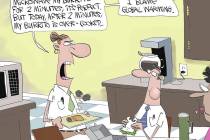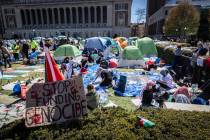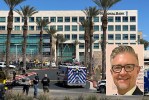Sequester hits hard for Nevada U.S. attorney’s office
The mandatory federal budget cuts known as sequestration can best be described as penny wise and pound foolish. Sequestration slashed funding to U.S. attorneys’ offices without regard to the cost to public safety and the government’s bottom line. The current budget logic forgets that U.S. attorneys’ offices not only protect the public, but also collect more money on behalf of the American taxpayer than they spend.
Our nation’s U.S. attorneys’ offices combat terrorism, organized crime, public corruption, fraud, violent crime, child predators and many other harms. During the past two years, the U.S. Attorney’s Office for the District of Nevada has brought to justice more than 1,000 persons for federal crimes such as mortgage fraud, identity theft, credit card fraud, gun crime and sexual exploitation of minors.
Sequestration cut more than $1 million from the Nevada U.S. Attorney’s Office budget for the 2013 fiscal year. Since a hiring freeze was imposed in January 2011, the Nevada U.S. Attorney’s Office has lost 17 employees due to budget constraints and has a total attorney vacancy rate of 22 percent. To make ends meet, we face potential unpaid furlough days for our employees in 2014. Furloughs were avoided in 2013 by depleting reserve funds and re-purposing money designated for training. Now that money is gone and cannot be used to prevent furloughs in 2014.
These dramatic cuts result in fewer cases and collections on behalf of the U.S. government. Our nation’s U.S. attorneys’ offices not only protect public safety, they also secure restitution for crime victims and recover monies for the American taxpayers through collections for civil judgments, fines, forfeitures and criminal assessments.
The Nevada U.S. Attorney’s Office collected $94 million for 2012, more than nine times the appropriated budget of our office for that year. Our district outcollected many of the nation’s larger districts in 2012 and was ranked 16th in the nation out of 94 districts. With fewer lawyers and support personnel, our ability to collect fines and restitution for crime victims will be hampered. By cutting the budgets of U.S. attorneys’ offices, sequestration is effectively reducing government revenue.
In addition to the financial impact, these across-the-board budget cuts also impede our ability to protect citizens and hold criminals accountable. With fewer employees, we will necessarily see reductions in the numbers of cases. The personnel reductions are particularly problematic as we tackle resource-intensive and increasingly complex cases involving national security, cybercrime, corporate and financial fraud, public corruption and health care fraud.
A case such as one recently completed against Eloy Garcia, Efrain Garcia, Francisco Garcia and Nabor Garcia might not be possible in the future, as we face drastic budget cuts and staffing shortages. These criminals used undocumented persons to help them unlawfully obtain millions of dollars of unemployment benefits from Nevada and the federal government. The extent of the fraud was staggering. The defendants filed almost 600 fraudulent unemployment claims and obtained more than $4 million in amounts of less than $1,000. Reductions in staff and training opportunities will impact our ability to bring such cases.
Though prosecutors and investigators will continue to prioritize cases to focus on the most serious crimes, they soon will be forced to make the painful choice of which case of corruption will go unchecked, which act of fraud will remain unaddressed and which child predator will remain at large. It is difficult to predict which uncharged crimes will lead to tragedy.
All of these are costs borne by the American people. Budget cuts may be necessary, but they need to be done with an eye toward the very real costs that come with them. We will fight hard to ward off the consequences of sequestration, but we will be doing so with one hand tied behind our backs.
Daniel G. Bogden is U.S. attorney for the District of Nevada.























